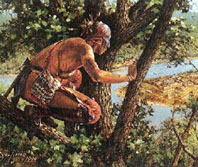| Today In History |
|
On July 8, 1905
| |
Part of Angel Island allocated for Immigration Detention Center
|
|

|
|
| Newsflash |
|
 IF YOU’VE GOT QUESTIONS ABOUT SOLAR ENERGY ... Not all that long ago now President Barack Obama "announced that ... grants will be available for those wishing to do research in renewable energy ... such as wind [and] solar." The next day "German industrial conglomerate Siemens AG said ... it will acquire a 28 per cent stake in Archimede Solar Energy S.p.A. to expand its expertise in solar thermal power plants." Meanwhile, for mere mortals who just want to know more the OpenSolar blog in the San Francisco Bay Area has been expanding its resources for letting you "ask questions about solar technology and get personal answers from experienced solar professionals and installation owners." All this remains one big piece in the big new clean-energy future that lies ahead. You can check it out in depth at ABOUT OPEN SOLAR! IF YOU’VE GOT QUESTIONS ABOUT SOLAR ENERGY ... Not all that long ago now President Barack Obama "announced that ... grants will be available for those wishing to do research in renewable energy ... such as wind [and] solar." The next day "German industrial conglomerate Siemens AG said ... it will acquire a 28 per cent stake in Archimede Solar Energy S.p.A. to expand its expertise in solar thermal power plants." Meanwhile, for mere mortals who just want to know more the OpenSolar blog in the San Francisco Bay Area has been expanding its resources for letting you "ask questions about solar technology and get personal answers from experienced solar professionals and installation owners." All this remains one big piece in the big new clean-energy future that lies ahead. You can check it out in depth at ABOUT OPEN SOLAR!
|
|
|
|
Written by L. Frank Bunting
|
|
|
|
Friday, 05 June 2009
 “Mostly,” the historian Jill Lepore wrote in a New Yorker article a few months ago, “we’re bankrupt of history.” And in the wake of General Motors’ decision of April 27, 2009 to discontinue the manufacture of Pontiac brand automobiles (and the still more recent GM filing for US bankruptcy protection on June 1), the historian Gordon Mitchell Sayre seems vaguely prophetic: “I would guess that fewer than one in ten of those who drive the automobiles that bear his name could identify the historical Pontiac” — the War Chief of the Ottawas who may or may not have engineered the formidable North American Indian uprising of 1763, sometimes still known as The Conspiracy of Pontiac. Sayre’s remarks hold for Canadian as well as US drivers of Pontiac automobiles. And yet Canada survives today partly because of what Pontiac did in the Great Lakes wilderness of the 1760s. In the early 21st century a properly decolonized country that was not quite so bankrupt of its own history might cast the Ottawa war chief in almost as prominent a role as the first prime minister of the Canadian confederation of 1867, John A. Macdonald! (Or as the still compelling fur-trade historian Harold Innis declared back in 1930: “We have not yet realized that the Indian and his culture were fundamental to the growth of Canadian institutions.”) “Mostly,” the historian Jill Lepore wrote in a New Yorker article a few months ago, “we’re bankrupt of history.” And in the wake of General Motors’ decision of April 27, 2009 to discontinue the manufacture of Pontiac brand automobiles (and the still more recent GM filing for US bankruptcy protection on June 1), the historian Gordon Mitchell Sayre seems vaguely prophetic: “I would guess that fewer than one in ten of those who drive the automobiles that bear his name could identify the historical Pontiac” — the War Chief of the Ottawas who may or may not have engineered the formidable North American Indian uprising of 1763, sometimes still known as The Conspiracy of Pontiac. Sayre’s remarks hold for Canadian as well as US drivers of Pontiac automobiles. And yet Canada survives today partly because of what Pontiac did in the Great Lakes wilderness of the 1760s. In the early 21st century a properly decolonized country that was not quite so bankrupt of its own history might cast the Ottawa war chief in almost as prominent a role as the first prime minister of the Canadian confederation of 1867, John A. Macdonald! (Or as the still compelling fur-trade historian Harold Innis declared back in 1930: “We have not yet realized that the Indian and his culture were fundamental to the growth of Canadian institutions.”)
|
| Last Updated (
Wednesday, 08 July 2009
) |
|
Read more...
|
|
|
Written by L. Frank Bunting
|
|
|
|
Sunday, 19 October 2008
 Just for the record, the former Governor General’s consort, John Ralston Saul, is not one of my favourite authors. And I haven’t exactly read his new book, A Fair Country: Telling Truths about Canada. But I have bumped into a few of its key messages in the mass media. The other night I saw him discussing the book on TV. And one of this weekend’s newspapers had two articles on the subject. He has now reached me to the point where I feel the urge to speak myself. So ... I think Mr. Saul carries some arguments too far in A Fair Country. And there seem more than a few ways in which he’s telling stories about history that are not historically accurate. But I also think he is pointing to something real about Canada’s past that is quite profound and deeply interesting for the present (and the future). And it has been largely ignored for far too long. He is not alone. He is focusing on aboriginal and multiracial themes in modern Canadian history, that have already been duly noted by the likes of Harold Innis (1930), Jennifer Brown (1980), Sylvia Van Kirk (1980), Bruce Trigger (1986), Richard White (1991), and Brian Slattery (1996). But Mr. Saul is raising important issues and he might attract wider attention — at a time that is almost begging for fresh debate on what Canada is supposed to be all about. Just for the record, the former Governor General’s consort, John Ralston Saul, is not one of my favourite authors. And I haven’t exactly read his new book, A Fair Country: Telling Truths about Canada. But I have bumped into a few of its key messages in the mass media. The other night I saw him discussing the book on TV. And one of this weekend’s newspapers had two articles on the subject. He has now reached me to the point where I feel the urge to speak myself. So ... I think Mr. Saul carries some arguments too far in A Fair Country. And there seem more than a few ways in which he’s telling stories about history that are not historically accurate. But I also think he is pointing to something real about Canada’s past that is quite profound and deeply interesting for the present (and the future). And it has been largely ignored for far too long. He is not alone. He is focusing on aboriginal and multiracial themes in modern Canadian history, that have already been duly noted by the likes of Harold Innis (1930), Jennifer Brown (1980), Sylvia Van Kirk (1980), Bruce Trigger (1986), Richard White (1991), and Brian Slattery (1996). But Mr. Saul is raising important issues and he might attract wider attention — at a time that is almost begging for fresh debate on what Canada is supposed to be all about.
Only registered users can write comments.
Please login or register. Powered by AkoComment 1.0 beta 2!
|
| Last Updated (
Thursday, 02 July 2009
) |
|
Read more...
|
|
|
Written by Citizen X
|
|
|
|
Thursday, 26 June 2008
 "Toronto," the local historian Percy Robinson wrote in 1933, is "the citadel of British sentiment in America, and Ontario, the most British of all the Provinces." An even 75 years later things have changed. Early in 2008 Angus Reid Strategies asked Canadians: "Would you support or oppose Canada ending its formal ties to the British monarchy?" Supporters of ending these now extremely vague and mysterious ties at last ranged from a mere 25% in Manitoba and Saskatchewan to 43% in each of Alberta and Atlantic Canada, 52% in British Columbia, and 54% in Ontario (second only to 71% in Quebec). A June 2008 headline in the Calgary Herald has similarly proclaimed: "Calling London: Calgary's hiring ... Faced with ongoing staff shortages and a tight labour market, city recruiters will spend the next few weeks in England ..." Once upon a time headlines of this sort haunted Toronto newspapers too. But though the Union Jack remains in the top left-hand corner of the current Ontario flag, it is another fading symbol. And you do have to wonder. In the early 21st century, in any part of the country, just how much longer can the old British North America last? "Toronto," the local historian Percy Robinson wrote in 1933, is "the citadel of British sentiment in America, and Ontario, the most British of all the Provinces." An even 75 years later things have changed. Early in 2008 Angus Reid Strategies asked Canadians: "Would you support or oppose Canada ending its formal ties to the British monarchy?" Supporters of ending these now extremely vague and mysterious ties at last ranged from a mere 25% in Manitoba and Saskatchewan to 43% in each of Alberta and Atlantic Canada, 52% in British Columbia, and 54% in Ontario (second only to 71% in Quebec). A June 2008 headline in the Calgary Herald has similarly proclaimed: "Calling London: Calgary's hiring ... Faced with ongoing staff shortages and a tight labour market, city recruiters will spend the next few weeks in England ..." Once upon a time headlines of this sort haunted Toronto newspapers too. But though the Union Jack remains in the top left-hand corner of the current Ontario flag, it is another fading symbol. And you do have to wonder. In the early 21st century, in any part of the country, just how much longer can the old British North America last?
Only registered users can write comments.
Please login or register. Powered by AkoComment 1.0 beta 2!
|
| Last Updated (
Thursday, 02 July 2009
) |
|
Read more...
|
|
|
|
|
|
|

 Heritage Now
Heritage Now